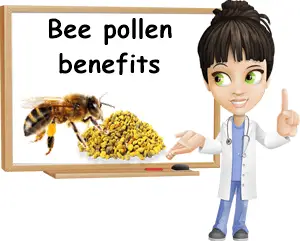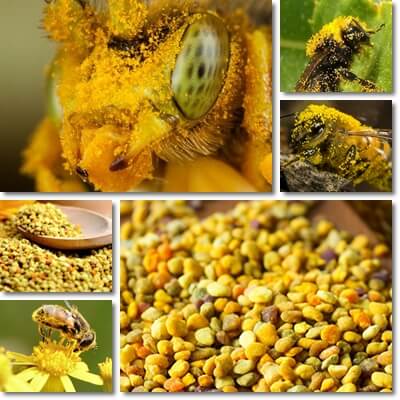Bee pollen is flower pollen collected by honey bees. It’s a wonderful source of essential nutrients, antioxidants and other elements with nutritional and therapeutic value. Bee pollen compliments an already healthy diet, adding to its benefits. It has medicinal value because it provides nourishment and energy, reduces tiredness and combats fatigue, contributes to resolving nutritional imbalances, boosts immunity, reduces swelling in the body, offers antioxidant protection, has antitumour benefits, may improve mood and appetite and even fertility in women.
In a healthy, varied and balanced diet, bee pollen is an extra source of nutrients, with a beneficial therapeutic action. For some of us it may hold greater benefits than for others, but also risks. Experts recommend eating limited amounts because bee pollen is not a food proper, but a natural dietary supplement. If you are lucky enough to not be allergic to pollen or honey bee products, then eating bee pollen can provide you with the following 11 extraordinary benefits:

1) Source of essential and non-essential nutrients with excellent nutritional value. Bee pollen is a source of essential nutrients such as vitamins C, D and E, B1, B2, B5, B6, B9, biotin (vitamin B7 or B8), carotenoids with vitamin A activity as well as potassium, magnesium, sodium, iron, calcium, phosphorus, zinc, copper, manganese, selenium and silicon. In addition to vitamins and minerals, it contains other important nutrients such as essential amino acids, proteins and carbohydrates, essential fatty acids, but also antioxidants with nutritional value (carotenois, for example). Overall, it provides nutrients our body requires in order to keep us alive and healthy.
2) Helps reverse nutritional deficiencies. Bee pollen has a dense and varied nutritional profile. Research shows that supplementation has the potential to fortify and revitalize the body, reversing the effects of certain vitamin and mineral deficiencies (Bee Pollen: Chemical Composition and Therapeutic Application). Animal studies also suggest it may encourage longevity. Nutritional deficiencies have been known to cause or favor the most diverse of health problems from poor growth and development in children, osteoporosis and poor immunity to cardiovascular events and miscarriage.
3) Tonic, energizing properties and strengthening action. Bee pollen has a tonic, revitalizing action, supporting both physical health and mental functions. It has been used to combat poor nutrition and malnutrition, but also found to encourage recovery following disease by strengthening the body and supporting the immune system. Studies show it can be effective for improving the side effects of chemotherapy. Moreover, there have been reports of bee pollen helping with weight gain in people struggling to maintain a healthy weight and restoring appetite in the elderly. Its strengthening action is also believed to improve fertility in women and favor conception.

4) Combats fatigue and stress. Its varied nutrient profile makes bee pollen a wonderful natural remedy for improving nutritional status and energy levels, supporting physical activity and cognitive performance and helping combat fatigue and stress. As I’ve learnt from my own experience, dealing with stress means your nutritional requirements grow, so you need more vitamins and minerals from nourishing food and even supplements to stay in good health.
5) Strengthens the immune system. Bee pollen has been found to stimulate the immune system, initiating mechanisms and supporting innate immune system processes that allow for a stronger response against infection and disease. For example, it has been shown to help the body make better use of nutrients that boost immunity, like vitamin C, increasing their concentrations in the immune system organs that are responsible for producing white blood cells.
6) Strong antibacterial and anti-inflammatory action. Bee pollen is a major contributor to the antibacterial properties of honey (read more about the different honey types and their properties). It plays a role in wound healing and the treatment of respiratory infections as a result of its immunomodulating properties, but also its anti-inflammatory and antimicrobial action. Animals studies reveal bee pollen can reduce swelling in the body, potentially improving inflammatory conditions like rheumatism.
7) Natural antibiotic and antifungal properties. Research shows bee pollen can inhibit strains of antibiotic-resistant bacteria such as Escherichia coli, Pseudomonas aeruginosa, Staphylococcus aureus, but also Candida albicans. The elements responsible for such benefits are the antioxidant flavonoids and phenolic acids (Antibacterial activity of honey and beebread of different origin against S-aureus and S-epidermidis, Food Technology and Biotechnology). However, remember that this doesn’t mean that bee pollen supplements can replace traditional antibiotics. If your doctor prescribes you antibiotics, it is important to take them as recommended.
8) Potentially good for allergies. Mast cells are a type of white blood cell of the immune system. One of their roles is to release histamine and trigger an immune system response against elements considered dangerous (pathogenic microorganisms like bacteria, parasites, viruses, but also cancer cells). For those with an overactive immune system, harmless elements like pollen cause an excessive immune system reaction accompanied by extensive inflammation that can make breathing difficult and cause an anaphylactic shock.
Bee pollen has been shown to prevent mast cells from degranulating which, in turn, prevents them from releasing histamine, exerting an anti-allergy effect (Inhibitory effect of honeybee-collected pollen on mast cell degranulation in vivo and in vitro, Journal of Medicinal Food). This effect has lead to pollen being used as a desensitivation strategy for allergy sufferers. At the same time, remember it is not safe to consume bee pollen or honey bee products if you are allergic to pollen or honey bees because it can result severe allergic reactions (anaphylactic shock).
9) Lowers bad cholesterol and triglyceride levels, may help prevent blood clots. According to studies, bee pollen contains healthy unsaturated fatty acids and phytosterols (a healthier, plant form of cholesterol which competes with it for absorption in the intestinal tract) which reduce lipid (fats) levels in the blood. This contributes to lower LDL cholesterol and triglyceride levels. Antioxidants in bee pollen further protect from lipid oxidation, while other elements have been found to reduce the risk of blood clots by discouraging platelet (or thrombocyte) aggregation. All of these actions contribute to better cardiovascular health.
10) Reported to improve mood and disposition. Bee pollen is reported to improve mood and disposition, making it good for mental health. Research suggests it may be used as an adjuvant to improve depression, apathy, mental fatigue etc. and support cognitive effort. Some people report it is good for hormonal imbalances, managing symptoms such as hot flashes, weight gain and others.
11) Antioxidant and anticancer properties. Antioxidants in bee pollen protect against the harmful action of reactive oxygen molecules called free radicals, preventing excessive cell damage that can lead to inflammation, disruption of normal cell functions and disease. Moreover, research suggests bee pollen also has the potential to reduce cancer risks by protecting cell membranes against lipid peroxidation, counteracting the effects of several reactive oxygen species, inducing apoptosis (programmed cell death) in cancer cells, activating the immune system response, exerting an antiproliferative effect and inhibiting tumour growth and other important mechanisms.
Conclusion
Bee pollen can be a great addition to our diet, provided we are not allergic to it. It supplies small amounts of important vitamins and minerals, antioxidants and other elements with nutritional and medicinal value and boasts antibacterial, antibiotic, anti-inflammatory, antitumour, anti-allergic and cholesterol-lowering properties. It has a strengthening action and is good for both physical and mental health, bringing wonderful benefits to a variety of health concerns.
